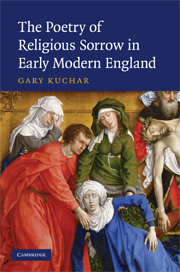Book contents
- Frontmatter
- Contents
- Acknowledgments
- Abbreviations and notes on texts
- Introduction: Of Sighs and Tears
- Chapter 1 The poetry of tears and the ghost of Robert Southwell in Shakespeare's Richard II and Milton's Paradise Lost
- Chapter 2 The poetry of tears and the metaphysics of grief: Richard Crashaw's “The Weeper”
- Chapter 3 The poetry of tears and the metaphysics of grief: Andrew Marvell's “Eyes and Tears”
- Chapter 4 Sad delight: Theology and Marian iconography in Aemilia Lanyer's Salve Deus Rex Judaeorum
- Chapter 5 Petrarchism and repentance in John Donne's Holy Sonnets
- Chapter 6 John Donne and the poetics of belatedness: Typology, trauma, and testimony in An Anatomy of the World
- Conclusion
- Index
- References
Conclusion
Published online by Cambridge University Press: 22 September 2009
- Frontmatter
- Contents
- Acknowledgments
- Abbreviations and notes on texts
- Introduction: Of Sighs and Tears
- Chapter 1 The poetry of tears and the ghost of Robert Southwell in Shakespeare's Richard II and Milton's Paradise Lost
- Chapter 2 The poetry of tears and the metaphysics of grief: Richard Crashaw's “The Weeper”
- Chapter 3 The poetry of tears and the metaphysics of grief: Andrew Marvell's “Eyes and Tears”
- Chapter 4 Sad delight: Theology and Marian iconography in Aemilia Lanyer's Salve Deus Rex Judaeorum
- Chapter 5 Petrarchism and repentance in John Donne's Holy Sonnets
- Chapter 6 John Donne and the poetics of belatedness: Typology, trauma, and testimony in An Anatomy of the World
- Conclusion
- Index
- References
Summary
This book has sought to demonstrate the religious and literary consequences following from the idea that godly sorrow is understood in the early modern period as a kind of language, indeed a kind of poetry. I have argued that because sacred grief is viewed in the period as linguistic in nature, the discourse of godly sorrow often functions as a medium for thinking through some of the most pressing theological, metaphysical, and literary questions at issue in the post-Reformation period. The verbal character of religious sorrow also means that it is thought to require close analysis, an awareness of figuration, and a critical recognition that Christian affects often signify in a way that has nothing or little to do with intention – as though such affects come to the supplicant from an immanent otherness that is “within” the soul but is not part of the self as such. In this respect, godly sorrow is a symptom of the fact that we are, as Augustine argues, “mysterious, even to ourselves.” Yet, even as godly sorrow is an expression of our own opacity to ourselves, it is also thought to help mitigate such opacity – providing a way out of our epistemological limitations and narcissistic inclinations.
Because godly sorrow is a mode of confession that happens at the furthest reaches of one's intention, one encounters it as a kind of text – indeed a sort of divine poem, in which one sees oneself from the point of view of an other.
- Type
- Chapter
- Information
- The Poetry of Religious Sorrow in Early Modern England , pp. 216 - 232Publisher: Cambridge University PressPrint publication year: 2008



